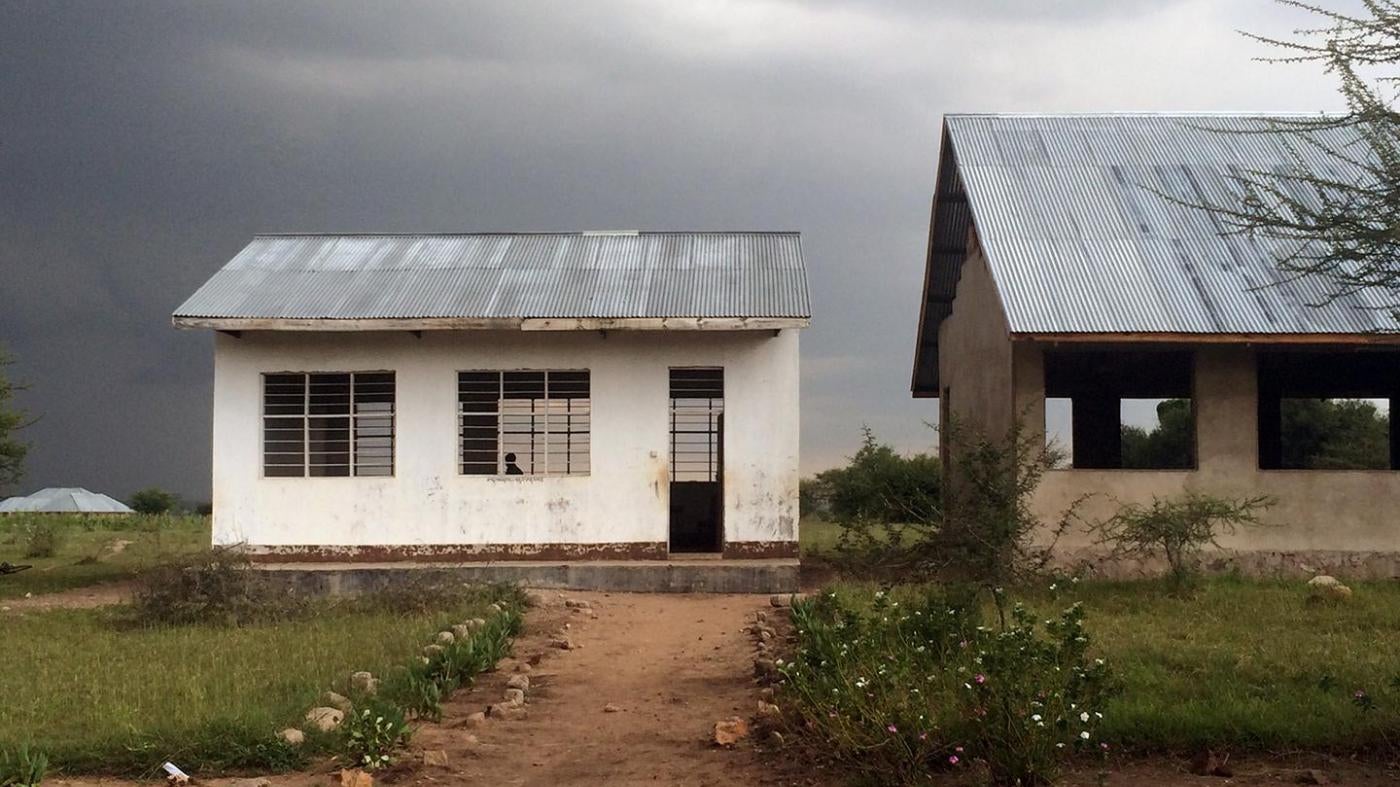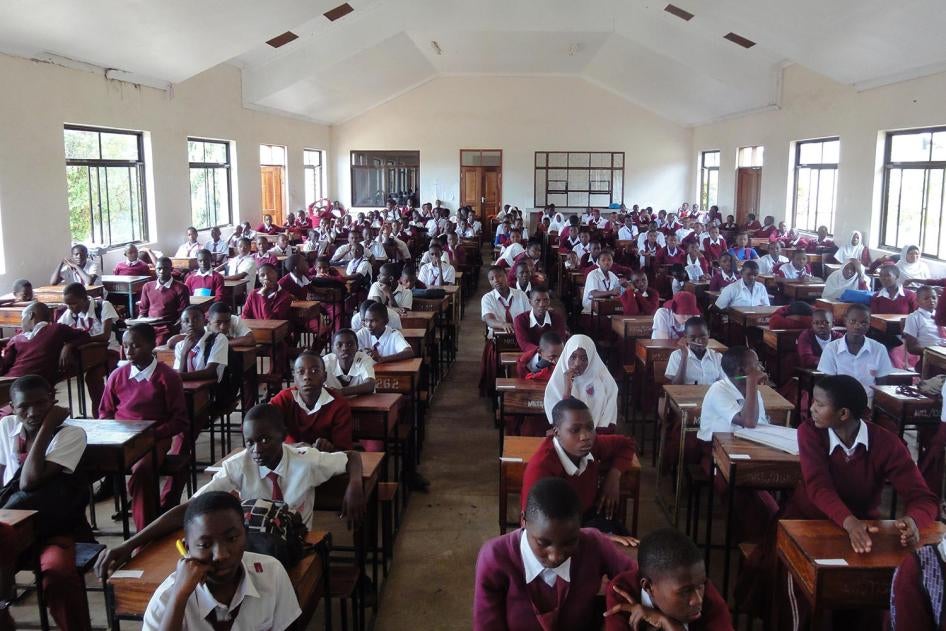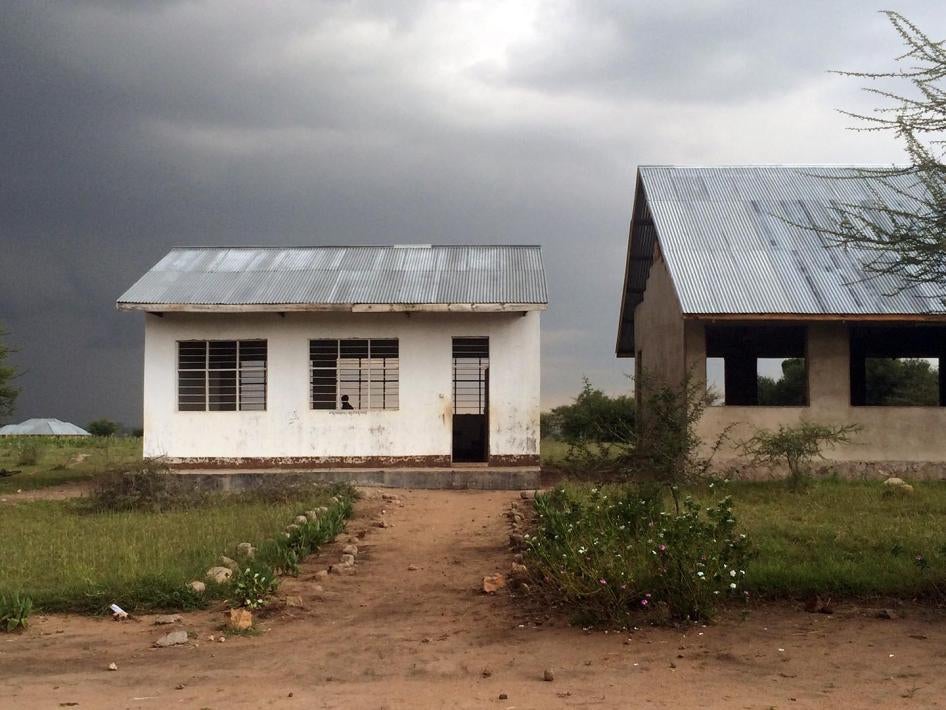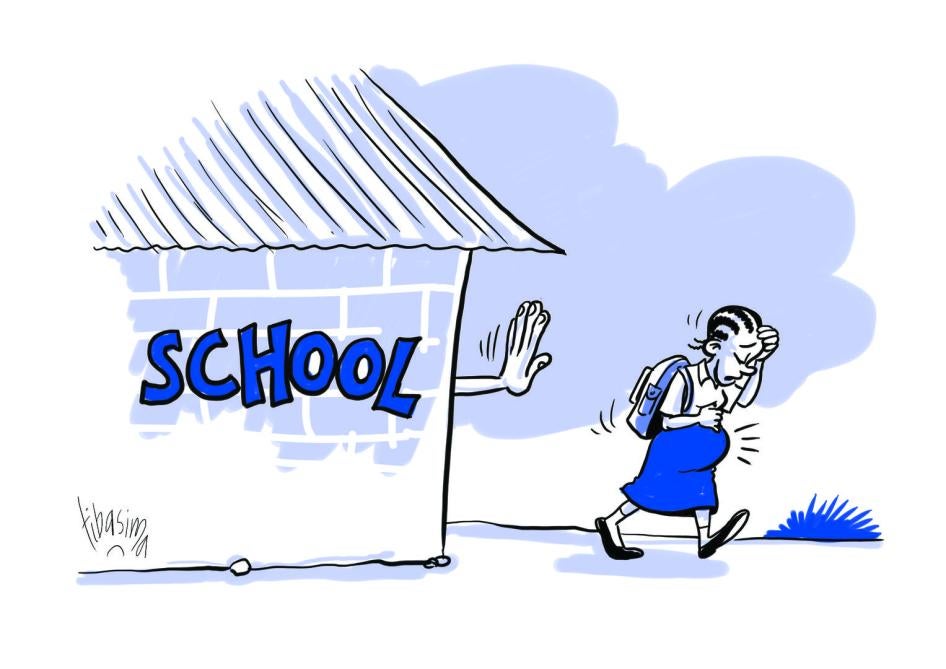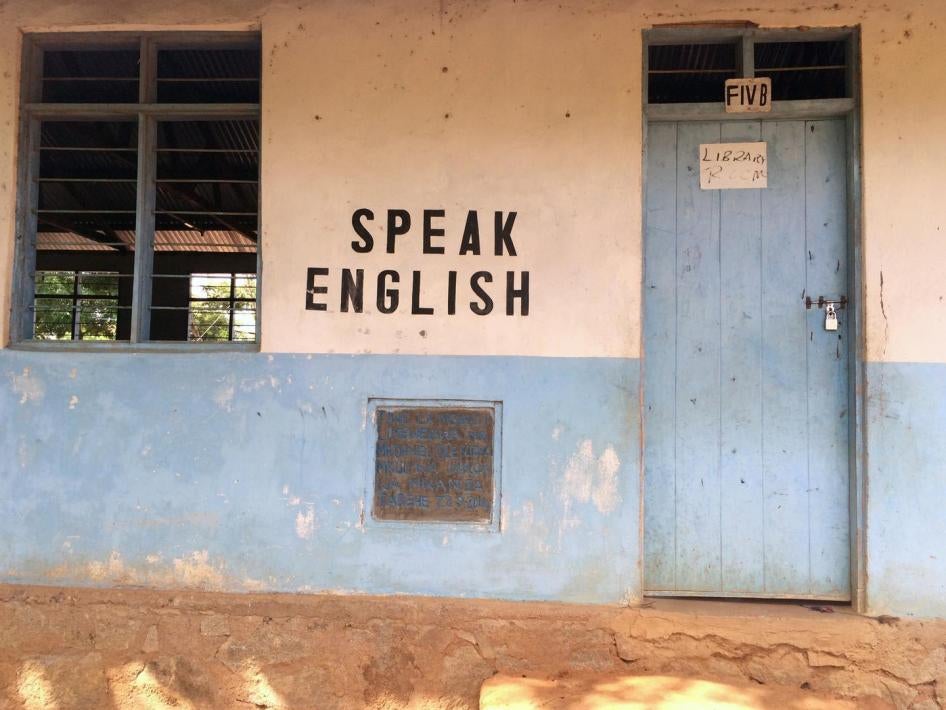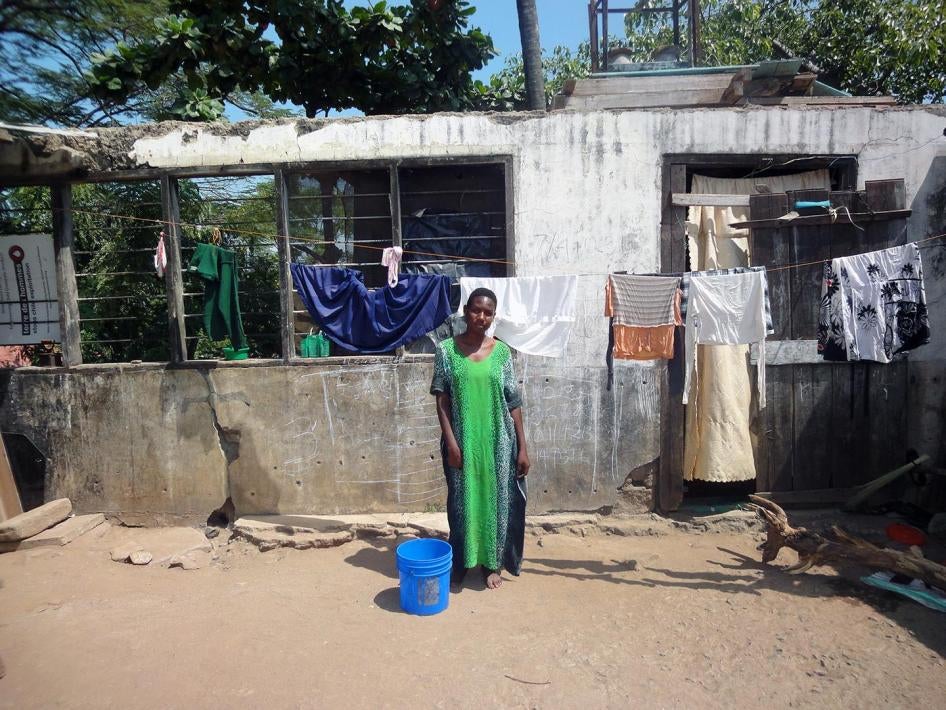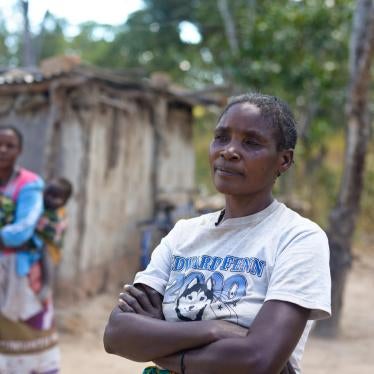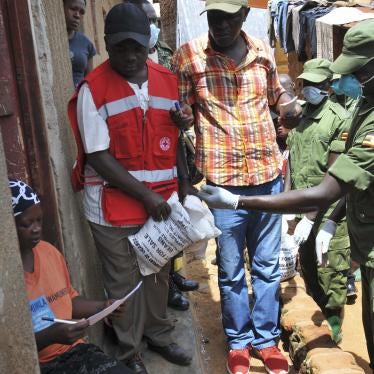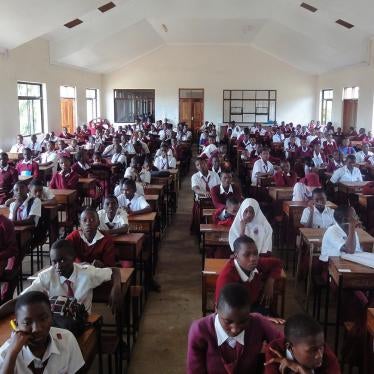Two in five adolescents are out of school in Tanzania, although the country has declared education a national priority and abolished school fees and financial contributions. Lack of money is, however, only one of the reasons why education ends after primary school for so many young people. Barriers include exams that limit access to secondary schools, long distances to schools, and outmoded policies, Human Rights Watch found in researching a new report, “‘I Had a Dream to Finish School.’” Girls have a particularly hard time. Subject to widespread sexual harassment and outright expulsion if they become pregnant, their dropout rate is higher than that of boys. Human Rights Watch’s Birgit Schwarz talked to researcher Elin Martinez about violence in schools, broken dreams, and what Tanzania’s government can do to improve access to education.
Tanzania has long made education a priority and recently removed school fees for lower-secondary education. So why did you decide to investigate this issue?
Since 2005, Tanzania has taken important steps to increase access to secondary education. Yet, 1.5 million adolescents are still out of lower-secondary school. We decided to look at barriers other than financial ones that stop adolescents from going to school. While additional resources are clearly needed – for example, to build more schools and infrastructure – there are a variety of improvements that do not necessarily require lots of additional resources but instead a change of mindset and policy reforms.
You interviewed more than 200 young people for this report. What did they tell you about their dreams and why they dropped out?
Fees had been a major reason for children to drop out. Teachers would send the kids home and tell them to only come back once they had paid up. In some cases, children told us their teachers would beat them up if they didn’t pay the fees.
One girl we interviewed had almost finished lower-secondary school, but had to drop out just before the final exam because her parents could not afford the final exam fee. A nongovernmental organization (NGO) referred her to a vocational center, and now, at 17, she was training to become a mechanic. But what she really wanted was to go back to secondary school and become an engineer.
Many children said they had not passed the Primary School Leaving Exam, which is currently necessary to continue on to secondary school. If they don’t pass, they’re not allowed to re-take the final year of primary school or the exam. Many drop out without learning basic skills or being able to read or write properly.
We interviewed many girls who had become domestic workers after they dropped out. They work extremely long hours, sometimes for an abusive employer. Some wanted to have their own small businesses, others wanted to go to secondary school to become doctors or engineers. But the second they start working, their dreams of further education come to an end.
Fewer than a third of girls entering lower-secondary school graduate. What causes girls to drop out more frequently than boys?
Teenage pregnancy, a huge public health issue in Tanzania, is a big barrier to girls completing school. More than 8,000 girls drop out of school annually and permanently because of pregnancy, although this is a gross underestimate according to many NGOs, and we found that schools often don’t report the reasons why students drop out. School officials regularly run mandatory pregnancy tests and expel girls who are pregnant. The government punishes any “offense against morality” with expulsion, because it thinks this will keep teenage pregnancies at bay. Married girls are automatically expelled in most and perhaps all schools. With almost two in five girls marrying before the age of 18, these policies affect a huge number of girls. The government is working on policies that would mandate schools to accept young mothers back at school. But even some government officials we talked to think that these reforms would encourage other girls to get pregnant.
Once they leave school, girls have limited options to return to formal schooling. There is no way for many of them to realistically raise their children while studying. Until the government sets up a good system to support them when they go back to school, their only option would be to attend alternative or informal educational programs. But this would not give them the skills or accreditation to get back on track.
Also, in some cases, families do not have resources to send all their children to secondary school, and they will opt to send the boys, while the girls are made to work.
And finally, there are many safety issues. Many girls told us of teachers who had harassed them or their friends. Several girls told us that their friends had become pregnant because a teacher had coerced them into a sexual relationship. While the girls had to drop out of school, the responsible teachers are still in the school. All of this combines to push girls out.
Does sexual harassment not get reported?
In most schools, there is simply no confidential reporting mechanism, and school officials seldom report incidents to the police. Girls told us that even when they turn to female teachers for help, they will be accused of having instigated the incident. NGOs and government officials are advocating for a system of trained counselors who can provide guidance and counseling and report abuse. But the reporting mechanism needs to be fully confidential and linked to law enforcement to ensure that sexual abuse is investigated and that the perpetrators are prosecuted rather than sent to a different school.
What fate awaits those who are expelled or drop out?
Once they are out of the formal education system, children must often pay private institutions to study for the equivalent grades. This means that secondary education remains an inaccessible dream for many of them.
In Mwanza, we met a large group of young mothers and pregnant girls who had been enrolled in a vocational course by a nongovernmental organization. They were learning computer literacy and other subjects. Many of these girls told us that their families were not supportive. One girl, whose parents were church leaders, had been kicked out of her home while pregnant. She went from one house to another, until she found a room. She worked extremely long hours in a factory, until she was eight months pregnant and in so much pain that she had to stop. Once she had given birth, she had to leave her baby behind when at work, with the door to her room open so that neighbors could keep an eye. But she simply had no choice. It was either that or going hungry.
Even now that she is doing this course, she is asking herself, “What is my future after this? What am I going to do next?”
Was there a story that moved you more than others?
It was painful and frustrating to hear children talk about the brutal nature of corporal punishment that is inflicted on them in schools. It was shocking to see the marks and scars on the girls’ legs, or hear how teachers were venting their anger and frustrations with a cane on children, hitting them on breasts or buttocks, teaching them fear. No one really learns in those conditions. It also goes against scientific evidence that shows that children’s cognitive development is particularly affected by repeated exposure to violence during adolescence.
There was a girl named Lucia who I met in Mwanza. She had first told us she had dropped out because of the distance to school. She had to negotiate a very rocky path each day. But when we carefully probed a bit further, she started talking about her teacher’s attempts to seduce her and coerce her into meeting him after sports practice. She first stopped going to field practice, then she stopped going to school for days. Her performance dropped and she felt she could not concentrate in class. In the end, she said she decided to stop wasting her parents’ money and to drop out altogether.
Many stories I heard were like this – stories of adolescents who had so much potential but who were pushed out or felt forced to leave because there was simply not enough money, because a teacher was trying to take advantage of them, or because they were pregnant.
What barriers to education do children with disabilities face?
A very small minority of students with disabilities make it to secondary education at all. An average school does not have the capacity to accommodate students with disabilities. Even in schools that are supposed to cater to students with disabilities, we found that buildings were not accessible, or the terrain was very difficult to navigate on a wheelchair or for blind students. Some students with disabilities told us they feel ignored and excluded in schools. There were many issues with students who are blind or have low vision, for example. The lack of equipment to translate materials into braille, for example, meant that these students dropped way behind the rest of the class, and many did not have adapted textbooks. Some students had to wait for over a month to get the material they need to follow what’s taught in class. Some students told us they want to become engineers or study science, but they’ve been told they can only study social sciences because math or science subjects are only available for sighted students.
How would you describe the quality of education in general?
Secondary education remains of poor quality in Tanzania, and the government recognizes this challenge. We found that many schools are not able to teach core compulsory subjects like science or mathematics because there is a substantial shortage of fully trained and qualified teachers, especially in rural areas. Most students only speak Swahili in primary school, but once they’re in secondary school, the language of instruction switches to English. Many told us they find it hard to follow their subjects because they don’t have enough support to learn and communicate in a new language. And while the average class size should be 40 to 45, we found classes that had up to 70 pupils.
Has the loss of income from school fees exacerbated the financial problems faced by schools?
The government’s decision to abolish all official school fees and additional financial contributions, including private tuition, as of January 2016, opened the doors to many adolescents whose parents or guardians could not afford to pay school fees for secondary school. Removing fees tackled one of the main barriers keeping children out of secondary school. However, school principals told us they were very worried because previously most schools would use parental contributions or funds raised by the community to pay for the school needs. But in January 2016, they had to stop new construction projects, such as building science labs that used to be mandatory, or separate latrines with running water for girls. Schools can no longer afford to hire temporary teachers to solve the teaching gap. On a positive note, the policy is nevertheless widely respected. It will be up to the government now to find ways of supplementing school budgets and ensure that schools can provide basic infrastructure and a conducive learning environment.
Tanzania is a low-income country. Can the government afford free secondary education?
Tanzania aspires to become a middle-income country by 2020, and education is a central component of that transformation. The government has shown a lot of political will to ensure access. In 2017, more than a fifth of the national budget is earmarked for education. The money partly came from cuts to all ministerial travel budgets, or expenses for national festivities, and an expanded tax base. But to continue making progress, the government will progressively need to allocate additional resources to cover the deficit in school budgets and to accommodate the increasing number of students who will enroll for secondary education now that it is free.
What needs to be done to improve the conditions for students who are currently in school?
The government should focus on the quality of education at all levels. This means all students should learn the basics early on in primary school so that they can confidently access and benefit from secondary school education. The government should phase out the primary school exam as a selective tool, and focus on ensuring all children are supported to complete lower-secondary education.
Discriminatory practices of expelling girls who become pregnant or marry should be abolished immediately, and policies to allow girls who dropped out to re-enter school should be put in place.
All forms of violence or abuse in schools, including corporal punishment, should be banned, and should definitely not be encouraged as a way of managing classrooms and enforcing discipline. The government needs to provide teachers with in-service training, particularly in classroom management, and cut down on class size. But to tackle the endemic nature of corporal punishment, the government needs to send out a clear message that it has no place in schools. Sexual abuse is certainly affecting a significant percentage of female students and also needs to be taken seriously. The government needs to set up monitoring mechanisms in schools and take action against teachers found to be abusing students. And in the long term, the government needs to build better infrastructure in every ward across the country and ensure that schools are adequately resourced with qualified teachers, equipment, and books.
Was there any story that gave you hope?
One of the people we worked with, Angel Benedict, was a former child domestic worker. She dropped out of school but was able to study the condensed secondary education curriculum with support from an NGO. She now runs an organization that helps child domestic workers and enables them to go back to school so that they can continue their education, graduate, and get proper jobs. She has become an important role model for many girls. Some call her their angel.
This interview has been edited and condensed.
